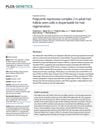Search
for
Sort by
Research
90-120 / 1000+ resultsresearch Vitiligo - Part 2 - Classification, Histopathology and Treatment
New vitiligo treatments focus on controlling immune damage and restoring skin color.
research The Effect of Two Combined Oral Contraceptives Containing Either Drospirenone or Cyproterone Acetate on Acne and Seborrhea
Both oral contraceptives reduced acne effectively and had similar positive effects on skin oiliness and hair growth.

research Involvement of 4-Hydroxy-2-Nonenal in Pollution-Induced Skin Damage
Pollution increases a compound in the skin that can lead to faster aging and more inflammation.

research Telogen Effluvium Due to Recombinant Interferon Alpha-2b
Half of the patients treated with a specific drug for skin cancer experienced hair loss not related to the drug's dosage.

research Traction Alopecia: 2% Topical Minoxidil Shows Promise. Report of Two Cases
Minoxidil helps hair regrowth in traction alopecia.
research Reduced Levels of 5-Alpha Reductase 2 in Adult Prostate Tissue and Implications for BPH Therapy
Some men's prostate tissues have low enzyme levels due to genetic changes, possibly affecting treatment for prostate enlargement.

research Investigation of Topical Application of Procyanidin B-2 from Apple to Identify Its Potential Use as a Hair Growing Agent
Apple-derived procyanidin B-2 can safely promote hair growth in men.

research Quantitative Assessment of 2% Topical Minoxidil in the Treatment of Male Pattern Baldness
The study tested a hair treatment and found it can help grow hair, but won't stop baldness. It's safe and works well, but needs more testing.

research Telogen Effluvium After SARS-CoV-2 Infection: A Series of Cases and Possible Pathogenetic Mechanisms
COVID-19 may cause early hair loss similar to classic temporary hair loss, with further research needed.

research Alopecia Areata in 2 Patients Treated with Dupilumab: New Onset and Worsening
Dupilumab for atopic dermatitis may cause new or worsen existing alopecia areata.
research The First Clinical Trial of Topical Application of Procyanidin B-2 to Investigate Its Potential as a Hair Growing Agent
Procyanidin B-2 lotion might help men grow thicker hair without side effects.

research Methotrexate for Generalized Pustular Psoriasis in a 2-Year-Old Child
Methotrexate effectively treated a 2-year-old's generalized pustular psoriasis without side effects.

research The Pharmacokinetics of 2.5- to 10-mg Oral Doses of Minoxidil in Healthy Volunteers
This document studied minoxidil in healthy volunteers. Minoxidil is quickly absorbed and eliminated from the body.

research Acute Telogen Effluvium Associated with SARS-CoV-2 Infection
A woman's sudden hair loss was linked to her previous COVID-19 infection.

research Hair Regrowth in Two Patients with Recalcitrant Central Centrifugal Cicatricial Alopecia After Use of Topical Metformin
Topical metformin helped regrow hair in two women with a hard-to-treat scarring hair loss condition.

research Alopecia Areata Presenting in Two Kidney-Pancreas Transplant Recipients Taking Cyclosporine
Two transplant patients on cyclosporine unexpectedly developed hair loss.
research Pmg-1 and Pmg-2 Constitute a Novel Family of KAP Genes Differentially Expressed During Skin and Mammary Gland Development
Pmg-1 and Pmg-2 are new genes important for skin and mammary gland development.

research The Role of Ketoconazole 2% Shampoo in the Treatment and Prophylactic Management of Dandruff
Ketoconazole shampoo treats dandruff and reduces hair greasiness.

research Expression Patterns of Glial Cell Line-Derived Neurotrophic Factor, Neurturin, Their Cognate Receptors GFRα-1, GFRα-2, and Common Signal Transduction Element c-Ret in Human Skin Hair Follicles
Certain proteins and their receptors are more active during the growth phase of human hair and could be targeted to treat hair disorders.
![Comparative Oncology: Evaluation of 2-Deoxy-2-[18F]Fluoro-D-Glucose (FDG) Positron Emission Tomography/Computed Tomography (PET/CT) for the Staging of Dogs with Malignant Tumors](/images/research/d55cf8d9-d8ee-4735-9b38-42a266b4059d/small/24322.jpg)
research Comparative Oncology: Evaluation of 2-Deoxy-2-[18F]Fluoro-D-Glucose (FDG) Positron Emission Tomography/Computed Tomography (PET/CT) for the Staging of Dogs with Malignant Tumors
FDG PET/CT scans can change cancer treatment plans for dogs.
research Efficacy of JAK 1/2 Inhibition in the Treatment of Diffuse Non-Scarring Alopecia Due to Systemic Lupus Erythematosus
Baricitinib might help treat hair loss in lupus patients, but more research is needed.

research The Role of SARS-CoV-2 Infection and Its Vaccines in Various Types of Hair Loss
COVID-19 and its vaccines can cause hair loss, which is not serious and can improve with psychological support.
research Genetic Association of Complement Component 2 Polymorphism with Systemic Lupus Erythematosus
The A allele of the C2 gene increases the risk of lupus, while the G allele may protect against it.

research Nuclear Factor (Erythroid-Derived 2)-Like-2 Pathway Modulates Substance P–Induced Human Mast Cell Activation and Degranulation in the Hair Follicle
Activating the Nrf2 pathway reduces inflammation and cell activation in human hair follicles, suggesting a potential treatment for certain hair loss conditions.
research Design, Synthesis, and Biological Evaluation of Novel Androst-3,5-Diene-3-Carboxylic Acid Derivatives as Inhibitors of 5α-Reductase Type 1 and 2
New chemical compounds were made that effectively block an enzyme linked to prostate growth.
research Autoimmune Polyglandular Syndrome Type 2, Alopecia Universalis, and Crohn's Disease
Managing multiple autoimmune diseases in one patient is extremely challenging.

research Polycomb Repressive Complex 2 in Adult Hair Follicle Stem Cells Is Dispensable for Hair Regeneration
Polycomb Repressive Complex 2 is not needed for hair regeneration.

research Male Balding as a Major Risk Factor for Severe COVID-19: A Possible Role for Targeting Androgens and Transmembrane Protease Serine 2 to Protect Vulnerable Individuals
Severe male balding may increase the risk of serious COVID-19, and treatments that reduce androgens or block a specific enzyme might help protect these individuals.

research 5-Alpha-Reductase Inhibitors Reduce Remission Time of COVID-19: Results From a Randomized Double-Blind Placebo-Controlled Interventional Trial in 130 SARS-CoV-2 Positive Men
5-Alpha-Reductase inhibitors shorten COVID-19 recovery time in men.